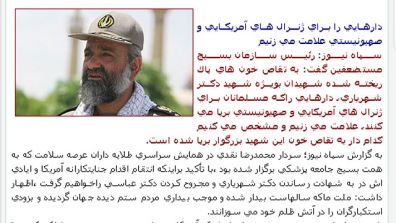Archives
December 15, 2010
Threats To Kill American Generals
Maybe we oughta talk to the Iranians and explain to them s-l-o-w-l-y why killing American Generals is a bad thing (see below).
That should do it, dontcha think?
FoxNews.com | December 15, 2010
Iran Threat to Kill American Generals Is Real, Experts Say

A Revolutionary Guard web site carried the speech of the Basiji Forces
commander claiming American generals will die.
EXCLUSIVE: A leader of Iran's powerful Revolutionary Guard is promising that American generals will be targeted and killed in revenge for last week's attacks on two of his country's leading nuclear scientists -- a threat Middle East experts say must be taken seriously.
In a speech published in Farsi at an Iranian website linked to the Revolutionary Guard, Brig. Gen. Mohammad Reza Naghdi was quoted as saying that "the filthy Americans and the Zionists should not think that with killing our scientists, they can divert our nation from its path of Jihad and scare us."
He continued with a specific threat: "We will mark the hanging sites of the American and Zionist generals and we will identify which hanging was in retaliation for the blood of our great martyr Shahriari."
Naghdi, commander of the Revolutionary Guard's Basij Forces, was referring to Dr. Majid Shahriari, a leading Iranian nuclear scientist who was reportedly heading efforts to fight the Stuxnet virus that has crippled Iran's nuclear program. Both Shahriari and another leading scientist, Fereidoun Abbasi, were targeted in simultaneous attacks last week in Tehran. As the men were driving to work, motorcyclists pulled up to their cars and attached magnetic explosive devices to them. The attackers drove off as the bombs exploded.
Shahriari was killed instantly; Abbasi, who was personally sanctioned by the United Nations for his part in the nuclear program, was wounded but managed to escape.
Reza Kahlili, a former CIA spy who left Iran first discovered the comments, said "that the United States should be concerned about this threat."
Jim Phillips, an expert on Middle East Policy for the Heritage Foundation, and Alireza Nader, an expert in Iran's leadership at the RAND Corporation, said Iran often makes outlandish threats, but they agreed that this one has to be taken as a serious and credible threat because it came directly from Naghdi.
"It is significant that this commander made specific threats," Nader said. "Usually these threats are taken with a grain of salt, but there is a history of the Iranian regime retaliating against U.S. forces in a covert manner, especially in Iraq."
But a Department of Defense spokesman said the military was not aware of the threat. "I have not heard those threats; DOD is not going to respond to such comments," said Maj. Chris Perrine, a public affairs officer. "Regarding security, we take appropriate security measures according to circumstances and are confident that our security posture in the region is appropriate."
Both Phillips and Nader said that the most likely place for an attack to occur would be Iraq, and any attack would most likely be carried out by surrogates working for the Iranian Revolutionary Guard.
"The Revolutionary Guards have been in Iraq since the 1980s and they have an extensive network there," Phillips said.
While Nader agreed that Iraq was the place Iran was most likely to strike, he also suggested that Bahrain, Qatar and other Gulf states would also allow the Iranian general to carry out the threat.
Original article here.
Log In »
Notable Quotables
"Mr. Netanyahu is one of the most media-savvy politicians on the planet. On Friday he appeared live via video link on 'Real Time with Bill Maher,' taking the host’s alternately sardonic and serious line of questioning with gazelle-like alacrity."
~ Anthony Grant, jourrnalist who has written for many major newspapers and worked in television at Paris and Tel Aviv, interviewing former PM Benjamin Netanyahu on Monday, at the outset of Mr. Netanyahu's new book (more here).


